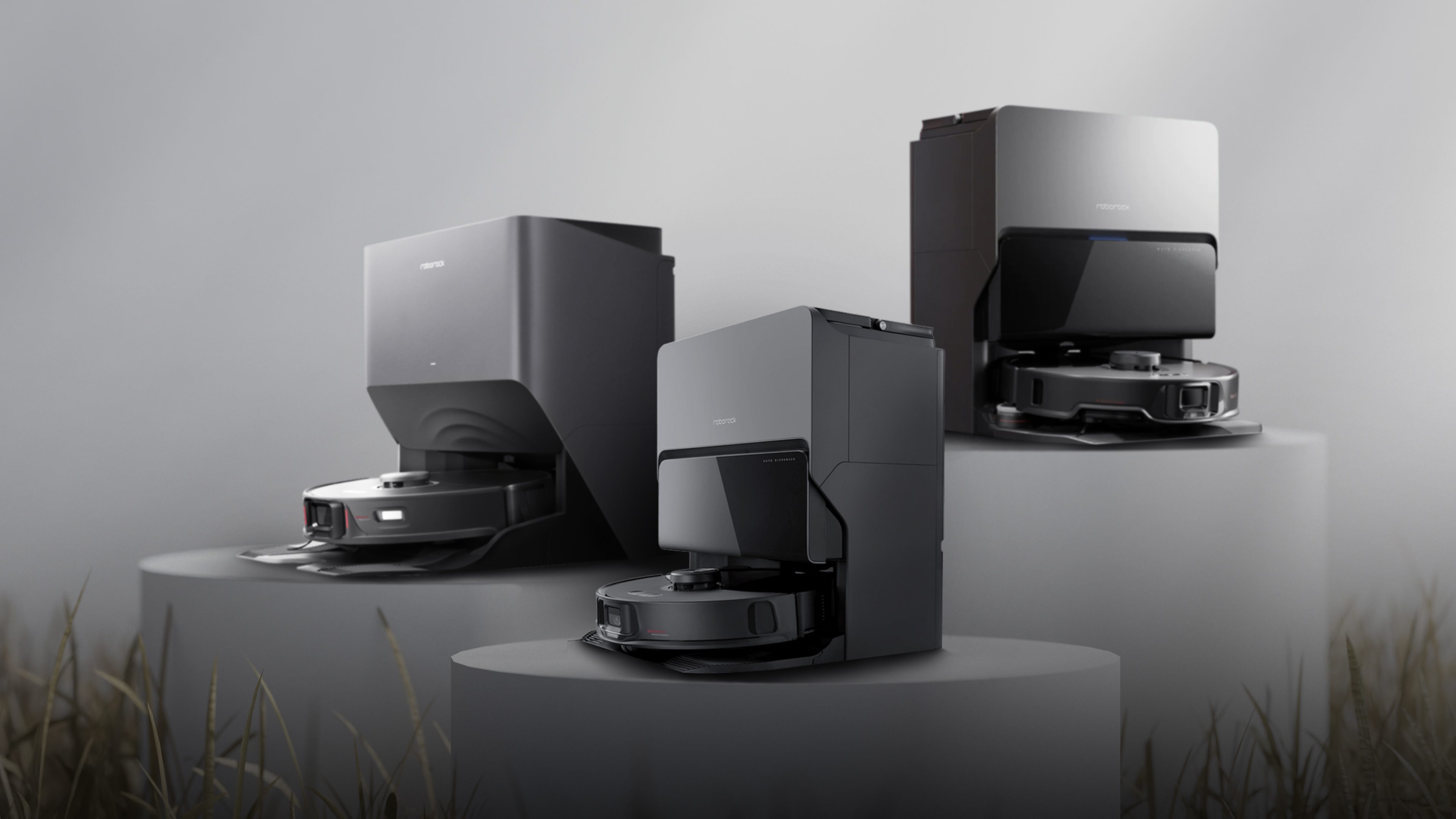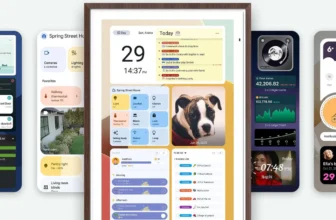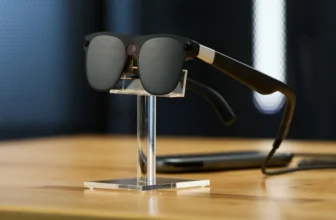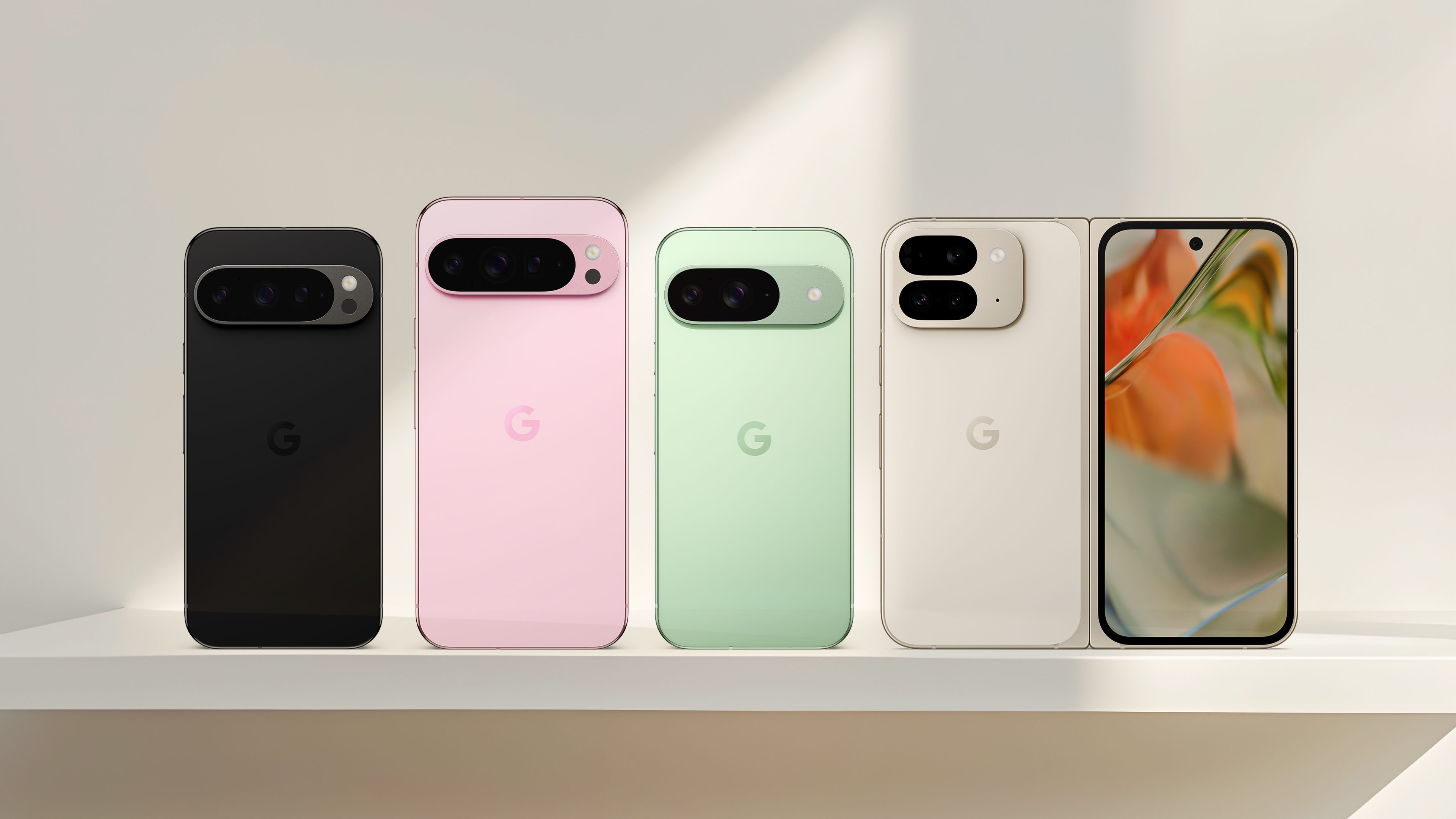
For starters, the new Google Pixel 9 Pro Fold is the successor to last year’s Google Pixel Fold. And there is a compact Pro version now. All phones share many similarities when it comes to hardware specs and software support, but there are a few things to keep an eye on, depending on your priorities. You can jump to specific sessions of this comparison right after this comparison table.
| The renamed foldable | Big-screen flagship | The new compact Pro | The vanilla flagship | |
|---|---|---|---|---|
| Product | ||||
| Picture |  |
 |
 |
 |
| Review |
|
|
|
|
| Display |
|
|
|
|
| SoC | ||||
| Memory |
|
|
|
|
| OS |
|
|
|
|
| Camera |
|
|
|
|
| Selfie Camera |
|
|||
| Battery |
|
|
|
|
| Connectivity |
|
|
|
|
| IP Certification | ||||
| Dimensions and weight |
|
|
|
|
| Offers* |
|
|
|
|
A bigger fold and a smaller Pro
The design for 2024 is mostly standardized in the looks department, with a pill-shaped—or search-box-shaped?—camera visor replacing the side-to-side design from the previous generations. All models feature rounded corners, similar to the Pixel 8 generation, with relatively thin bezels around the OLED displays.
The Fold model is IPx8-rated for waterproofness, without resistance against fine particles or dust. The slab phones, meanwhile are all IP68-rated for both water and dust protection. All four models feature metal frames, with Gorilla Glass Victus 2 in the front and back. The Pixel 9 Pro and 9 Pro XL feature a frosted finish on the back cover, with a shiny finish on the base model, and a semi-gloss material on the Fold.
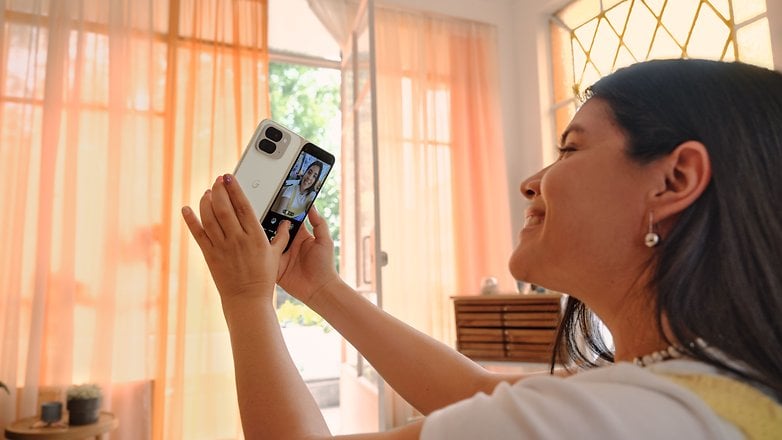
Color options also vary according to the models, with the Pixel 9 Pro Fold available in Obsidian (black) and Porcelain (white) options. The two other 9 Pro models extend that selection with Hazel (gray) and Rose Quartz options, while the standard Pixel 9 replaces those with Wintergreen and Peony (rose) colorways. Oh, and the color finish also applies to the camera island with a different shade.
The smaller Pixel 9 Pro and the vanilla Pixel 9 share the same dimensions, with one extra gram of weight for the Pro version. The other phones are bigger and heavier, as expected, but the foldable phone trades the passport proportions of the first generation for a standard aspect ratio on the external display.
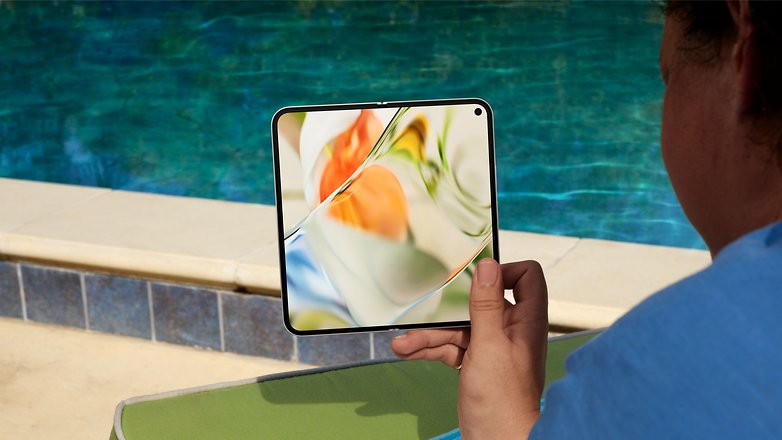
By the way, the Fold’s external display is on paper very similar to the Pixel 9 screen, with a 6.3-inch OLED panel with a 2424 x 1080 resolution, and a fixed refresh rate of 120 or 60 Hz. The internal screen on the Pixel 9 Pro Fold is now a big 8-inch, with a more premium OLED panel, featuring variable refresh rates between 1 and 120 Hz for power savings, and an almost square 2152 x 2076 resolution.
Both Pixel 9 Pro slabs are equipped with LTPO OLED panels, featuring the same range of screen refresh rates, but their resolutions differ to accompany the dimensions: 2992 x 1344 for the 6.7-inch and 2856 x 1280 for the 6.33-inch. Google was very adamant about that 0.03-inch, as a way to differentiate the two smaller phones, presumably with thicker bezels on the vanilla model.
Finally, like so many other 2024 launches, all four phones feature high peak brightness levels: 2700 nits for the Pixel 9 and Pixel 9 Pro Fold and 3000 nits for the Pixel 9 Pros.
New Tensor chip with the usual AI support
All four Pixel 9 models are powered by the same Tensor G4 processor paired with the Titan M2 security chip. Similar to previous generations, don’t expect chart-conquering performance in benchmark tests, but this is something we will need to confirm as soon as we test the phones.
Connectivity-wise, all phones are compatible with modern wireless standards including eSIM, Wi-Fi 7, Bluetooth 5.3, and NFC. The three Pro models also feature UWB support, which is not available on the base model.
Versatile cameras all around
For image capturing, we find a different line-up of sensors between the foldable and non-foldable models, so we will start with the Pixel 9 Pro Fold. While all Pro models feature a triple camera set with main+ultrawide+5x zoom telephoto lenses, the resolution and sensor sizes on the Pro Fold are smaller: 48, 10.5, and 10.8 megapixels respectively (with 1/2”, 1/3.4”, and 1/3.2” sensors), arranged in two rows.
The slab Pixel 9 Pros replaces those with 50, 48, and 48-megapixel sensors, with bigger areas: 1/1.31”, 1/2.55”, and 1/2.55” respectively. So don’t expect the same camera performance on the foldable Pixel. The Pixel 9 Pro camera specs are roughly similar to those in the previous generation, but the ultrawide lens is now “brighter” with a f/1.7 aperture, which should help low-light performance in open shots.
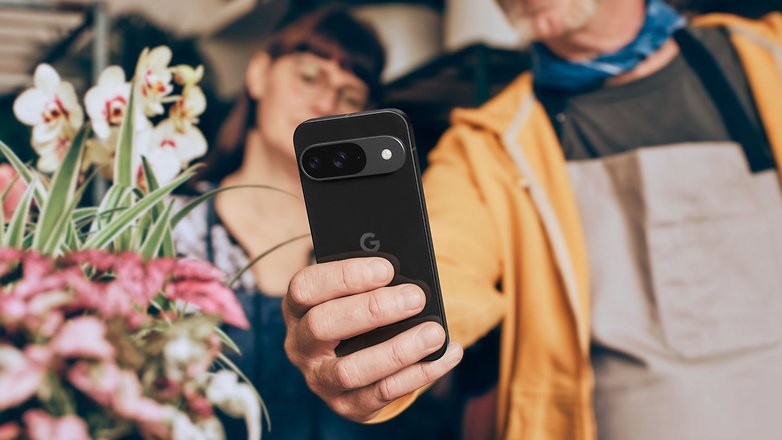
The vanilla Pixel 9, for its part, features only the main and ultra-wide cameras, with similar specs as in the more expensive models.
Google highlights that the ultra-wide camera features “macro focus”, but doesn’t disclose the minimum focusing distance. On the other end of the focal length, the telephoto cameras on the three Pro models offer the same 5x magnification, but the Fold tops at 20x digital zoom, while the other models reach 30x magnification.
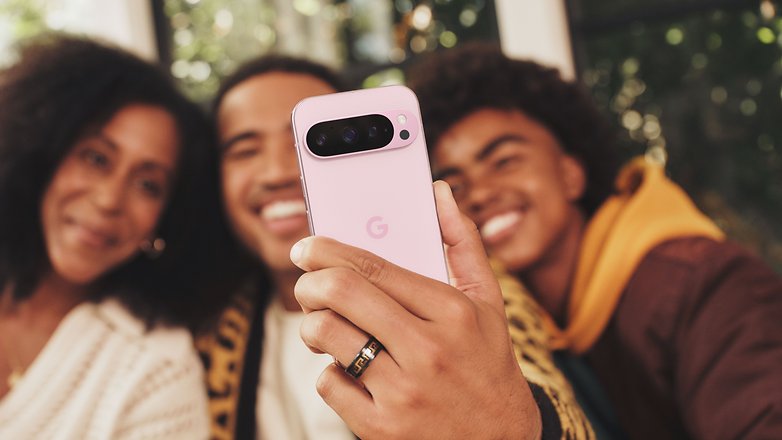
For selfies, the Pixel 9 Pro Fold has a pair of 10-megapixel sensors—on the external and internal displays—while the Pixel 9 is equipped with a 10.5 MP component. The Pixel 9 Pros, meanwhile, offer 42 megapixels of resolution on that tiny camera punch-hole.
Google advertises that the “Super High-Resolution Zoom” magnification is now available also on videos, and recordings can be set at 8K resolution for those with no regard to storage capacity.
Other new camera tricks include an “Add Me” feature to add missing people to the scene, and the Magic Editor can change the image composition.
Seven years of software updates as usual
Speaking of software features, Google promises seven years of Feature Drops, with the same coverage for both Android updates and security patches. It is worth noting that all four models will launch with Android 14, so don’t expect to see the Pixel 9 models receiving the Android release in 2031 (Android 22, if everything goes accordingly) if Google keeps releasing Android versions in September or October.
Faster charging, but not by much
All Pixel 9 models list support for Google’s new 45 W wired charger. Google later clarified this by listing a maximum input of 37 W for the Pixel 9 Pro XL and 27 W for the smaller phones, while the Fold charges at a maximum of 21 W.
All models also feature wireless charging, with Google only mentioning Qi certification and not the latest version. All slab phones top at 12 W charging using Qi-compatible wireless chargers, with different input charging using the Pixel Stand, and they also feature Battery Share (reverse wireless charging). The Pixel 9 Pro Fold’s specs sheet doesn’t mention Battery Share, and we have yet to hear from Google after asking about the feature.
Price and availability
| Pixel 9 Pro Fold | Pixel 9 Pro XL | Pixel 9 Pro | Pixel 9 | |
|---|---|---|---|---|
| 1 TB | ❌ | $1,549 | $1449 | ❌ |
| 512 GB | – | $1,319 | $1,219 | ❌ |
| 256 GB | $1,799 | $1,199 | $1,099 | $899 |
| 128 GB | ❌ | $1,099 | $999 | $799 |
| Colors | Black White |
Black White Gray Pink |
Black White Gray Pink |
Black White Green Pink |
Prices for the Pixel 9 start at $800 and reach $1550 for the Pixel 9 Pro XL 1 TB—US pricing for the Fold to be confirmed—but expect to see the usual pre-order bonuses from both the Google Store and partner retailers and phone carriers.
Pre-orders should be live as you read this article. However, the phones will arrive to customers and store shelves at a later date. The Pixel 9 Pro Fold is scheduled for September, while the other three models are set for the next week (August 22nd, according to Gemini, following the store page suggestions).
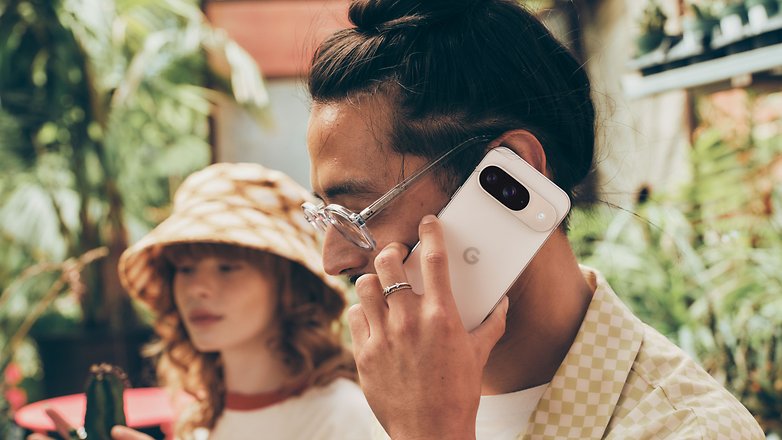
For our international audiences, there is also a different availability depending on the phones. The Pixel 9 Pro Fold will be available in the following countries:
- Americas: Canada, USA.
- Europe: Austria, Belgium, Denmark, Finland, France, Germany, Ireland, Netherlands, Norway,
Switzerland, Sweden, UK - Asia-Pacific: Australia, India, Japan, Singapore, Taiwan.
The other three Pixel 9 phones will additionally be available in these countries: Czechia, Estonia, Hungary, Italy, Latvia, Lithuania, Poland, Portugal, Romania, Slovakia, Slovenia, Spain, and Malaysia.
Conclusion
The biggest news from the Pixel 9 launch is probably the new variants. The compact Pixel 9 Pro and the foldable Pixel 9 Pro Fold (weird names aside) give some hints that the Pixel family is stronger than ever.
However, the overall update to the 2024 line-up is rather timid, without groundbreaking features or hardware changes for the users. We can’t comment more before testing the phones, during which we will also check the camera, battery, and overall performance. So follow us on social media or sign up for notifications to read our impressions as soon as we publish them.
What do you think of Google’s 2024 line of phones? Did you expect more significant changes than what we got in the end? Share your opinions in the comments section below.



